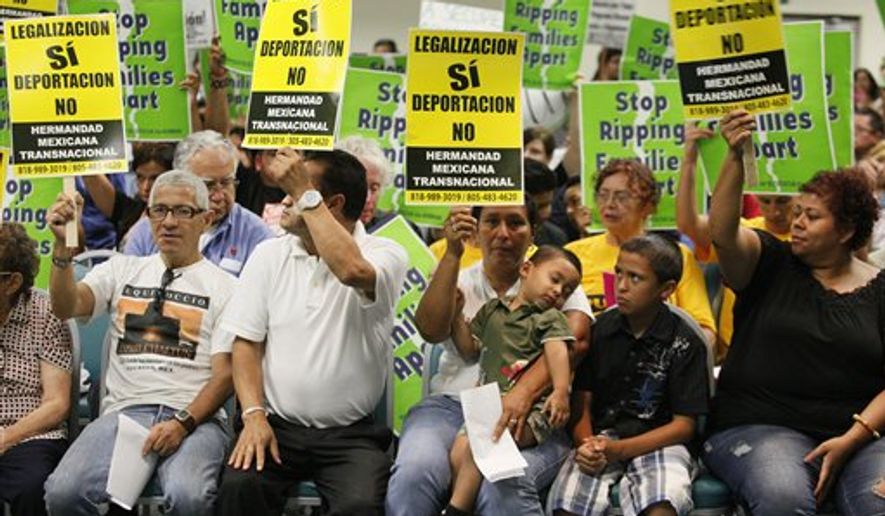Bowing to pressure from immigrant rights activists, the Obama administration said Thursday that it will halt deportation proceedings on a case-by-case basis against illegal immigrants who meet certain criteria, such as attending school, having family in the military or having primary responsible for other family members’ care.
The move marks a major step for President Obama, who for months has said he does not have broad categorical authority to halt deportations and said he must follow the laws as Congress has written them.
But in letters to Congress on Thursday, Homeland Security Secretary Janet Napolitano said she does have discretion to focus on “priorities” and that her department and the Justice Department will review all ongoing cases to see who meets the new criteria.
“This case-by-case approach will enhance public safety,” she said. “Immigration judges will be able to more swiftly adjudicate high-priority cases, such as those involving convicted felons.”
The move won immediate praise from Hispanic activists and Democrats who had strenuously argued with the administration that it did have authority to take these actions, and said as long as Congress is deadlocked on the issue, it was up to Mr. Obama to act.
“Today’s announcement shows that this president is willing to put muscle behind his words and to use his power to intervene when the lives of good people are being ruined by bad laws,” said Rep. Luis V. Gutierrez, Illinois Democrat, who has taken a leadership role on the issue since the death of Sen. Edward M. Kennedy in 2009.
The new rules apply to those who have been apprehended and are in deportation proceedings, but have not been officially ordered out of the country by a judge.
Ms. Napolitano said a working group will try to come up with “guidance on how to provide for appropriate discretionary consideration” for “compelling cases” in instances where someone already has been ordered deported.
Administration officials made the announcement just before Mr. Obama left for a long vacation out of Washington, and as members of Congress are back in their home districts.
The top House Republican on the Judiciary Committee said the move is part of a White House plan “to grant backdoor amnesty to illegal immigrants.”
“The Obama administration should enforce immigration laws, not look for ways to ignore them,” said Rep. Lamar Smith, Texas Republican. “The Obama administration should not pick and choose which laws to enforce. Administration officials should remember the oath of office they took to uphold the Constitution and the laws of the land.”
Immigration legislation has been stalled in Congress for years as the two parties have sparred over what to include.
Republicans generally favor stricter enforcement and a temporary program that would allow workers in the country for some time, but eventually return to their home countries. Democrats want the legislation to include legalization of the estimated 11 million illegal immigrants now in the country, and want the future guest-worker program to also include a path to citizenship so those workers can stay permanently.
Since 2007, when the issue stalled in the Senate, more than 1 million illegal immigrants have been deported.
Democrats said those deportations are breaking up families and that it’s an unfair punishment for a broken system.
Hispanic voters are a key voter bloc as Mr. Obama seeks re-election next year, but many of them felt he broke his promise to them to work on legislation once he took office. Thursday’s move already was paying dividends as Hispanic advocacy groups praised the steps.
“After more than two years of struggle, demonstrations, direct actions and other activities, the administration has signaled that they are capable of delivering direct relief for immigrant families,” said Casa de Maryland, a pro-immigrant group. “We eagerly await confirmation from community members that their families can now expect to remain together.”
Two years ago, some staffers at U.S. Citizenship and Immigration Services had prepared a draft memo arguing that the administration retained broad powers that could serve “as a non-legislative version of ’amnesty.’ “
But agency leaders and others in the administration had argued that the memo was inaccurate.
It was unclear Thursday how many people might be affected by the new rules. Pressure groups said up to 300,000 people could be eligible. In fiscal year 2010 alone, the government deported nearly 200,000 illegal immigrants who it said did not have criminal records.
Given the case-by-case basis of Thursday’s announcement, though, the groups said the actual number of people allowed to stay could be far lower.
In June, U.S. Immigration and Customs Enforcement, the agency that handles interior immigration law enforcement, issued guidance expanding authority to decline to prosecute illegal immigrants. The goal, ICE leaders said, was to focus on catching illegal immigrants who have committed other crimes or are part of gangs.
The chief beneficiaries of the guidance are likely to be immigrant students who would have been eligible for legal status under the Dream Act, which stalled in Congress last year.
Senate Majority Leader Harry Reid, Nevada Democrat, who asked Homeland Security this year to exempt illegal-immigrant students from deportation, said the move will free up immigration courts to handle cases involving serious criminals.
• Stephen Dinan can be reached at sdinan@washingtontimes.com.




Please read our comment policy before commenting.